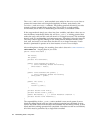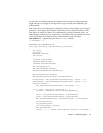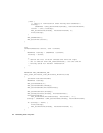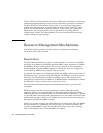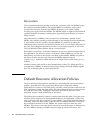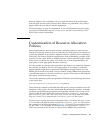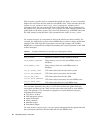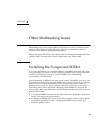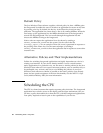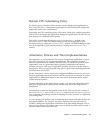
24 Multitasking Guide • May 2007
Revocation
The revocation mechanism lets the system take a resource from one MIDlet to give
the resource to another MIDlet. This second MIDlet is sometimes said to have
preempted the resource from the first MIDlet. Resources are revoked without
receiving any request from the MIDlet. The MIDlet might or might not be informed
explicitly that the revocation is taking place, depending upon the type of resource
being revoked.
After allocation by a MIDlet, many resources are deallocated explicitly by the
MIDlet. For example, opening a socket allocates it, and closing the socket deallocates
it, after which it can be reused by another MIDlet. If a socket is revoked, the
underlying native resources are reclaimed, but the Java Socket object still exists. In
this case, any subsequent operations on this Socket object results in an I/O error.
The Java Wireless Client software doesn’t revoke sockets.
Revocation is not always so drastic. Sometimes it can occur almost transparently to
the application. The device’s screen is a resource. When a MIDlet is put into the
background, its access to the screen is revoked so that another MIDlet can paint to
the screen. In this case, the only effect on the MIDlet might be that its
hideNotify() method is called and that it no longer receives calls to the paint()
method.
Another resource that can be revoked transparently is the CPU. When the CPU is
revoked from a MIDlet, its threads simply stop running. When the MIDlet regains
the CPU, its threads pick up where they left off.
Default Resource Allocation Policies
The Java Wireless Client software provides two preconfigured resource allocation
policies: open and fixed. The open policy allows open competition among
applications for resources. The fixed policy provides a fixed amount of resources for
each application. Under the fixed policy, the reservation and limit for each resource
are set to the same value. Setting the reservation and limit to the same value
effectively creates a fixed partitioning of resources.
The policies have tradeoffs. Neither is clearly better than the other. Using the open
resource policy might lead to unpredictable behavior. An application could at any
time receive an error that a resource is not available. Users might find this behavior
confusing. Under the fixed policy, if the amount of available resources is less than
the reservation amount for a new MIDlet, the system refuses to start any more
MIDlets. This occurs even if the actual amount of unused resources is sufficient for
the new MIDlet, meaning valuable resources might go unused. However, this



